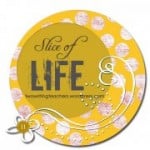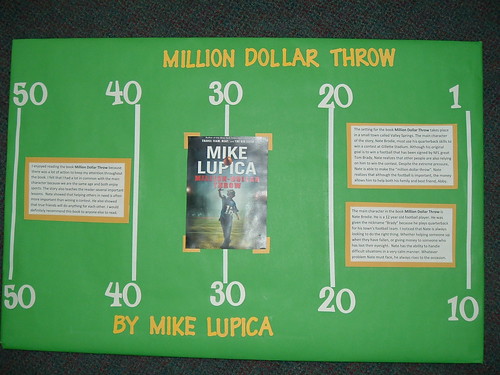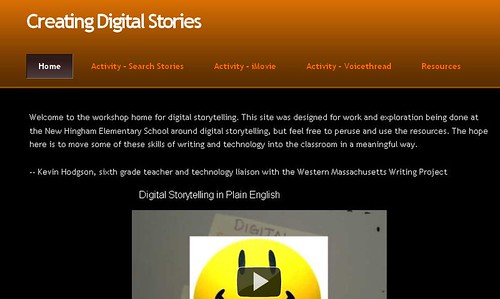Here is another in my March Book Madness feature, in which I am sharing out book projects and reviews from my students and myself. This one is about The Clockwork Three by Matthew Kirby. This student and I were actually reading the book at the same time, and having interesting discussions about how Kirby was slowly bringing the three main characters together. This glogster report about The Clockwork Three is actually in addition to a paper project he did on the book.
Peace (in sync),
Kevin
Monthly Archives: March 2011
Slice of Life: Shhhh! We’re Testing
 Round one of this week’s Reading Comprehension state testing began yesterday and I don’t think I have had a class work as hard, or as long, on the test as I have with this year’s crew. Some of them were at it for more than 2 1/2 hours (on a test the state suggests will take about an hour).
Round one of this week’s Reading Comprehension state testing began yesterday and I don’t think I have had a class work as hard, or as long, on the test as I have with this year’s crew. Some of them were at it for more than 2 1/2 hours (on a test the state suggests will take about an hour).
Here are some snapshots from my perch as teacher:
- The school provides some pre-testing snack food. Yesterday, it was goldfish and juice. Before I knew it, they were all trying to toss the fish in the air and catch them in their mouths. I let it go on for a second, until the fish were landing on the ground. “OK, enough,” I shouted. “Pick up the fish.” Their response? “Ahhh.”
- They had to put my name on the cover of the test this year. This is new and no doubt, it is a result of some cheating or accountability problems in some districts (not ours). Even at this point in the year, some kids still have trouble spelling my name! And one of them wrote down me as a MRS. I explained that my wife was in another school that day, helping to oversee high school MCAS (true).
- They asked if they could take off their shoes. I had never been asked that before, but I didn’t care. Almost everyone did, and one of my more exuberant student shot her feet into the air to show off her mismatched, colorful socks. “Look at my toes!” she giggled, which eased some of the stress in the room.
- I saw a hand across the room. A student, whose second language is English and who struggles with reading comprehension, called me over and pointed to a word. “What does that mean?” he asked, looking up at me. I could only shake my head and tell him I could not help. I saw tears in his eyes for a second, then he got back down to the problem. It broke my heart.
- I had to exchange nine pencils during testing because they were writing so much on the open response questions, they had run their pencils down to the nub. In fact, I saw them doing a lot of writing, making notes and making outlines. I believe a few even wrote a first draft in their test booklets before a final draft in their answer booklets.
- Another hand. I wandered over. “I think I made a big mistake,” she whispered. These are not words you want to hear in a state testing environment. She had written the open response answer in a space for another question. OK. I grabbed an eraser and told her to rewrite her response in the right space and then do a good job erasing the other one, and she should be fine. “You’re fine. Don’t worry,” I told her, and she seemed to settle down.
- Once they are done, they can read. Only read. But the time stretched on so long that one of my antsy boys lost interest in his book and began to dissemble his pen and then use the spring to launch the pen cap into the air. He was doing it silently, and with focus. I let him go until another student began to imitate him, adding her rocket to the launch sequence. Suddenly, the airspace felt crowded. I told them to stop, and told the boy later, “Make sure you have a good book with you on Friday.”
- We are not allowed to look at the tests or their answers, and I don’t. But I couldn’t help noticing as I was wandering the classroom that there was a play skit as one of the reading passages this year. We had done an entire unit this year on writing and reading plays. I have myself a little mental fist pump on that one.
Round two for Reading Comprehension is tomorrow, and then we are done for awhile (until Math rolls around in May).
Peace (in the testing),
Kevin
March Book Madness: Million Dollar Throw
Thank God for Mike Lupica. I’ve seen more of my boys reading his books over the years, due to the sports theme, than others when it comes time for choosing independent books. Million Dollar Throw is one that appeals to the football players and fans in my classes. I think they are intrigued by the million dollar reference, too.
This student decided to do an offline poster, which is fine, and showed good insight into the characters of the book. His journal was full of questions and predictions. This is part of my daily March Book Madness feature this month.

Peace (in the toss),
Kevin
Slice of Life: Expert Advice from Students
 We’ve been working in class on paragraph writing in a slow, logical progression that began first with the Origins of Words, then shifted into Parts of Speech, and then on to the Structure of a Sentence, and now into Paragraphs, to be followed by a Research Essay.
We’ve been working in class on paragraph writing in a slow, logical progression that began first with the Origins of Words, then shifted into Parts of Speech, and then on to the Structure of a Sentence, and now into Paragraphs, to be followed by a Research Essay.
Yesterday, my students shared out their expository paragraph on the theme of explaining how to do something. This is a pretty typical school assignment, but it does tap into student knowledge about a task, and puts it into explanatory writing.
I was thinking that I wish I had time for two more expository activities (maybe next year, when the Common Core starts to creep further in, as it shifts writing more into informational next and away from narrative): creating a video tutorial, using the writing as the script, with groups working on how to videos; and moving into a Make Session around students in groups working on hands-on projects, and then learning aspects of technical writing. I’m not there yet, but I see the possibilities of extending informational writing.
While some of the topics of their writing sound familiar to anyone who has done this activity, (sports, baking cookies, etc.), there were a few paragraphs this year that were nicely off the beaten trail, a bit. As they were sharing them with the class, I jotted down some notes on topics they chose that seemed interesting:
- How to create a movie with Pivot Stickfigure animation software (frame by frame, patience is key for a smooth movie);
- How to read and play Drum Sheet Music (each line is a different drum or percussion instrument);
- How to clean a fake beard (which she wore for her presentation and giggled a lot);
- How to annoy your siblings (a crowd pleaser for the younger siblings in class — a warning shot for the older siblings);
- How to build an arctic igloo out of ice cream (then, you get to eat it, so it’s win-win);
- How to play the ukelele (which he demonstrated to the cheers of the class);
- How to kickstart a dirt bike (in case you get stuck in the woods);
- How to make a live action movie (start with a script, but then improvise. You’ll have more fun that way.);
- How to fill out an NCAA Basketball Bracket for March Madness (go for top-seeded teams and hope for some luck);
- How to use a ripstick (motion of your lower body makes the skateboard-like object move, and but don’t fall. You’ll get road rash.);
- How to wear pointe shoes for dance (protect your toes. We all agreed the shoes looked uncomfortable.);
- How to play power chords on the guitar (crank your amp for greatest effect).
Peace (in the expertise),
Kevin
March Book Madness: No Small Thing
I am not all that familiar with horse-inspired books, but the girls in my class are. Here, one of my students reviewed No Small Thing by Natalie Ghent. Not long after this glogster project was made, I saw this book being passed around a small group of girls, no doubt dreaming of riding in pastures. This is another in my series of March Book Madness posts.
Peace (in the fields),
Kevin
Slice of Life: Slowing Down Time
 We were settling into a nighttime routine, my son and I, slowing down the day before sleep.
We were settling into a nighttime routine, my son and I, slowing down the day before sleep.
“What words did you learn at school today?”
“AT!” he shouts, with some frustration. He’s only six.
“At?”
“We already knew it. It was already in our circle. Next to ‘the,’ and ‘to,’ and ‘and.’ You know … the circle,” he says, using his hands to demonstrate the circle. The circle is where they keep high-use words that they are learning in his kindergarten class.
“Well, it’s good to keep using new words.” I sound more like a teacher than a dad at that point, but he doesn’t seem to notice.
He nods, the frustration now fading.
I have watched him closely this year in kindergarten. His reading and writing skills has blossomed so much since September. Each week seems to bring new developments in his learning. With two other kids, you would think this would be no surprise. But it is. He surprises me daily.
When we read books, he picks out words from the text to read. He’s writing little stories, making comics. “We’re making books and books and books,” he informed me earlier in the day. He and two friends have become co-authors on what I can only guess, knowing them, will be another history of the Star Wars Universe.
His literacy development is on full display, if we just take the time to watch and observe him, and ask questions. His teacher is doing a great job, pushing him and nurturing him. And so is he. I guess we are, as well.
Peace (in the snapshot),
Kevin
March Book Madness: The Lightning Thief
For the past two years, I have taught The Lightning Thief by Rick Riordan as a class novel, with great success. This year, however, too many kids have already read it perhaps inspired by last year’s movie), so I am shelving it for the year. That saddens me, but I do see many other kids still enjoying it. This Glogster project is just one of a couple that were done on the series by my students. It continues my March Book Madness feature.
Peace (in the search),
Kevin
Slice of Life: Very Small Twitter Poems
 Yesterday morning, I read an article from The New York Times about efforts by writers to use the Twitter format to write very short poems. I am always intrigued by how technology informs our writing, and how our writing can be adapted to technology. So, throughout the day, I tried my hand at some Twitter poems, and used the #poetweet hashtag to share my writing with others.
Yesterday morning, I read an article from The New York Times about efforts by writers to use the Twitter format to write very short poems. I am always intrigued by how technology informs our writing, and how our writing can be adapted to technology. So, throughout the day, I tried my hand at some Twitter poems, and used the #poetweet hashtag to share my writing with others.
It’s challenging, as you can imagine. The constraints of 140 characters leaves very little room for exploration. You need to be short and you need to choose your words carefully. It’s a great exercise in editing, actually, and I wonder if some variation might not work well in the classroom.
Here are some of the poems as screenshots off Twitter, which I recast into podcasts this morning, too.
Peace (in the poems),
Kevin
March Book Madness: Scat
I’m continuing with my March Book Madness. I had a number of students who read Scat by Carl Hiaasen. They got hooked on his style of writing from when we read Flush as a class novel, I think. This particular student is a strong reader, and she really enjoyed the story here, as you can tell from her glogster poster about Scat.
Peace (in the swamps of Florida),
Kevin
Slice of Life: Leading a Digital Storytelling Workshop
 I spent four hours yesterday with a small group of teachers in our school district who wanted to learn more about digital storytelling. The principal found some money for Professional Development, we negotiated a fair price, and I developed a plan of action for the day, along with multiple resources.
I spent four hours yesterday with a small group of teachers in our school district who wanted to learn more about digital storytelling. The principal found some money for Professional Development, we negotiated a fair price, and I developed a plan of action for the day, along with multiple resources.
The session went wonderfully well. We were doing hands-on work with Google Search Stories, then into iMovie, and then onto Voicethread. I peppered my work with leading questions around how technology and media are changing our perceptions of composition (and we had a long conversation about how important “design” is in this world). There was laughter, silence, sharing and reflection.
(see some of the Search Stories they created)
Then, one of the teachers asked, “What is this Writing Project I see on some of the books and papers you brought?”
It was an opening I wasn’t quite expecting, but I was ready to explain all about the National Writing Project, and most important, I talked about how the experiences within the NWP prepared me for the kinds of presentations I was doing with them. It was one teacher sharing their knowledge with another, or teachers teaching teachers. It was hands-on activities, followed by reflective pedagogical practice. It was examining what the students might need for learning. It was even about bringing enough food to the session.
(See a voicethread they played around with)
I owe a lot to the Western Massachusetts Writing Project for my ability to lead workshops and PD sessions. My experience there, and the nurturing that I got over the years (I remember Paul Oh inviting me to be his partner at my first National Writing Project Annual Meeting, to talk about advanced summer technology institutes) has profoundly shaped me as a workshop leader. I never would have known I had it in me, to be honest, until someone tapped me on the shoulder (Paul and Bruce Penniman, among others) and said, you should do this. You can do this. The door opened for me and it has remained open since then, and that has forever changed my own perception of myself as an educator.
Whether or not my teaching colleagues from yesterday follow me into the WMWP, they certainly got a taste of what it means to be in a NWP session around writing and technology. They were learning. They were doing. They were reflecting. They were writing.
(You can come view our workshop website and use the resources as needed. The NWP is also about sharing with the world).

Peace (in the workshop model),
Kevin